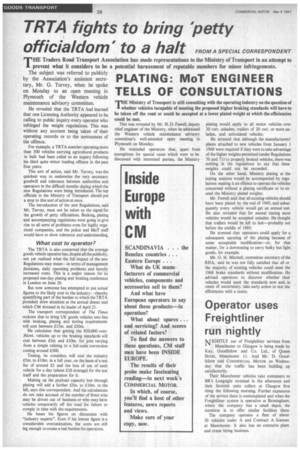TRTA fights to bring 'petty
Page 30

If you've noticed an error in this article please click here to report it so we can fix it.
officialdom' to a halt FROM A SPECIAL CORRESPONDENT maintenance advisory committee.
He revealed that the TRTA had learned that one Licensing Authority appeared to be calling to public inquiry every operator who infringed the weight regulations. This was without any account being taken of their operating records or to the seriousness of the offence.
For example, a TRTA mem ber operating more than 500 vehicles carrying agricultural products in bulk had been called to an inquiry following his third quite minor loading offence in the past four years.
This sort of action, said Mr. Turvey, was the quickest way to undermine the very necessary goodwill and tolerance between authorities and operators in the difficult months during which the new Regulations were being introduced. The top officials in the Ministry of Transport should put a stop to this sort of action at once.
The introduction of the new Regulations, said Mr. Turvey, must not be taken as the signal for the growth of petty officialdom. Braking, plating and accompanying regulations were going to give rise to all sorts of problems even for highly organized companies, and the police and MoT staff would have to show tolerance and understanding.
What cost to operator?
The TRTA is also concerned that the average goods vehicle operator has, despite all the publicity, not yet realized what the full impact of the new Regulations may mean—in terms of management decisions, daily operating problems and heavily increased costs. This is a major reason for its proposed one-day plating and braking conference in London on June 29.
But now someone has attempted to put actual figures to the likely cost to the industry—thereby quantifying part of the burden to which the TRTA president drew attention at the annual dinner and which CM stressed in its leader of April 21.
The transport correspondent of The Times reckons that to bring UK goods vehicles into line with braking, plating and testing requirements will cost between £15m. and £30m.
He calculates that getting the 850,000 over30cwt. vehicles up to the braking standards will cost between £5m and £10m. for jobs varying from a simple relining to a full-scale conversion costing around £500.
Testing, he considers, will cost the industry £5m. to £10m, in a full year, on the basis of a test fee of around £5 and the loss of use of each vehicle for a day (about £10 average) for the test itself and the preparation for it.
Making up the payload capacity lost through plating will add a further Ern. to £10m. to the bill, says this correspondent, And his calculations do not take account of the number of firms who may be driven out of business or who may have vehicles temporarily off the road for failure to comply in time with the requirements.
He bases his figures on discussion with "industry experts". Even if his lowest figure is a considerable overestimation, the costs are still big enough to create a real burden for operators.




















































































































